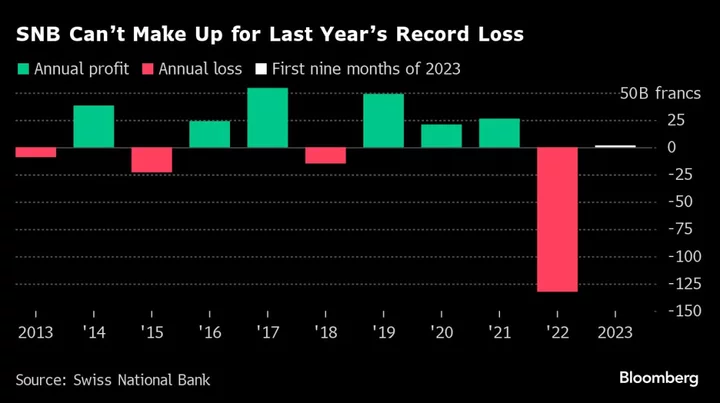The Swiss National Bank looks increasingly likely to skip its annual payout to shareholders and the government for a second time after losses on its stock and bond portfolios hurt earnings.
A bad third quarter weighed on SNB profits, bringing the nine-month figure to 1.7 billion francs ($1.9 billion) from 13.7 billion francs at the end of June.
The earnings report comes as the central bank tries to make up for 2022’s record loss, which forced it to forgo a payout for only the second time in its history. Economists at UBS say that a distribution for 2023, the SNB would have to earn more than 40 billion francs in the final quarter — a scenario deemed “extremely unlikely.”
Switzerland’s central bank earned 7 billion francs on its bond and equity holdings in foreign currencies in the nine-month period, according to a statement Tuesday. A lower gold price saw bullion gains slip to 1.1 billion francs and interest paid out to banks yielded a 6.1 billion-franc loss on Swiss franc positions.
Price gains on the equities portfolio shrank to 20.5 billion francs, while bonds saw a loss of 4.2 billion francs. The dollar’s recent rally against the franc mitigated some losses in the third quarter, bringing exchange-rate shortfalls to 19.2 billion francs.
Results are much lower than the 4 billion-9 billion franc profit predicted by UBS Group AG economists Alessandro Bee and Florian Germanier.
After the results, Germanier told Bloomberg that the third-quarter loss was “across the board” higher than expected. He added that the small remaining profit does little to alleviate a 40 billion-franc shortfall the SNB still carries on its balance sheet from last year.
“Whether they can make a payout even in 2025 depends on how stock and bond markets develop next year,” he said. “It will be difficult to make up for these 40 billion.”
Bank Deposits
Along with central banks around the world, the SNB has seen assets amassed in a phase of low inflation and ultra-low borrowing costs lose value. The institution’s balance sheet is particularly inflated due to decade-long efforts to keep a cap on the franc’s strength.
To limit the interest it has to pay to banks after the end of negative rates, the central bank said Monday that it will stop paying for the money lenders are required to keep at the institution as a minimum reserve. The change will reduce costs but won’t impact monetary policy, it said.
The central bank said Tuesday that it paid 5.4 billion francs to banks on sight deposits in the period.
The SNB’s results are heavily influenced by developments in markets and don’t influence monetary policy. Preliminary full-year results are due Jan. 9.
Before that, Switzerland’s next interest-rate decision is scheduled for Dec. 14, with economists predicting that officials will hold borrowing costs for a second consecutive meeting. Still, Vice President Martin Schlegel said over the weekend that a hike “cannot be ruled out” if needed to curb inflation.
(Updates with economist comment starting in seventh paragraph)

